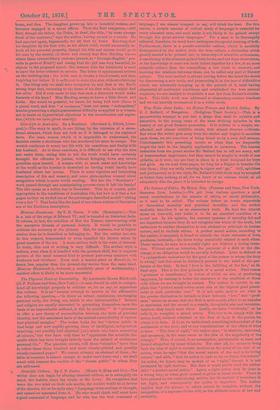Scientific Culture. By J. P. Cooke. (Henry S. King and
Co.)—The writer does not begin by abusing classical culture, as is unhappily too much the fashion since the tirade of Mr. Lowe. He recognises that were the two triod on their sole merits, the verdict would be in favour of the classics, for as he aptly says, "Language is the medium of thought, and cannot be separated from it. He who would think well must have a good command of language, and ho who has the best command of language, I am almost tempted to say, will think the best. For this reason, a certain amount of critical study of language is essential for every educated man, and such study is not likely to be gained except through the great ancient languages." For a man to be thoroughly' cultured, therefore, he must have undergone the special training of both. Furthermore, there is a pseudo-scientific culture, which is carefully distinguished by the author from the true culture, a distinction which greatly needed to be pointed out, in these days of scientific enthusiasm, A smattering of the sciences gained from books,and not from observation, or the knowledge of some few facts linked together by a law, is no more scientific culture than the committing a few roots to memory, and knowing the relations between them, can be called any part of literary culture. The true method is always having before the mind the desire for discovering a now truth, and prosecuting it, in the face of difficulties which are constantly cropping up in the pursuit of it, until having eliminated all accidental conditions and established the true natural sequence, we are enabled to formulate a new law from Nature's statute- book. This little work was addressed to elementary-science teachers and we can heartily recommend it to a wider circle.


































 Previous page
Previous page